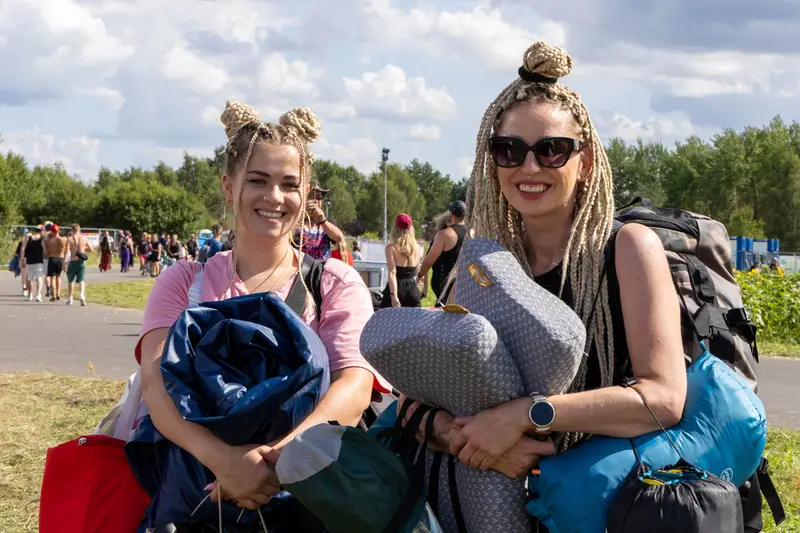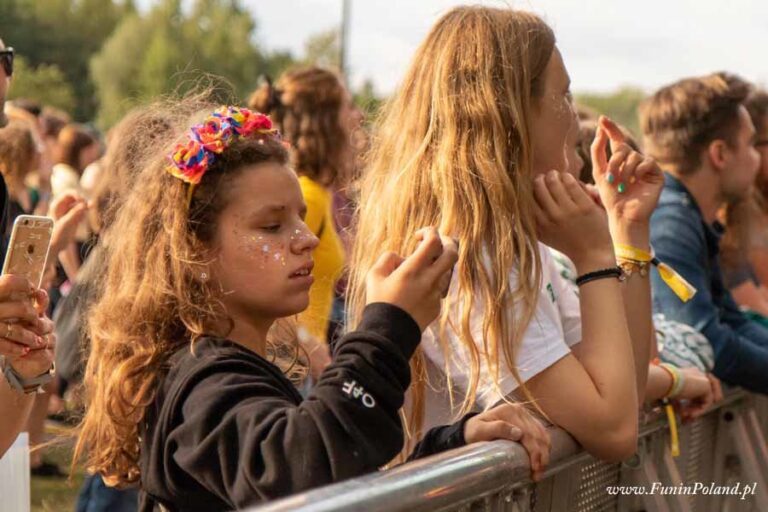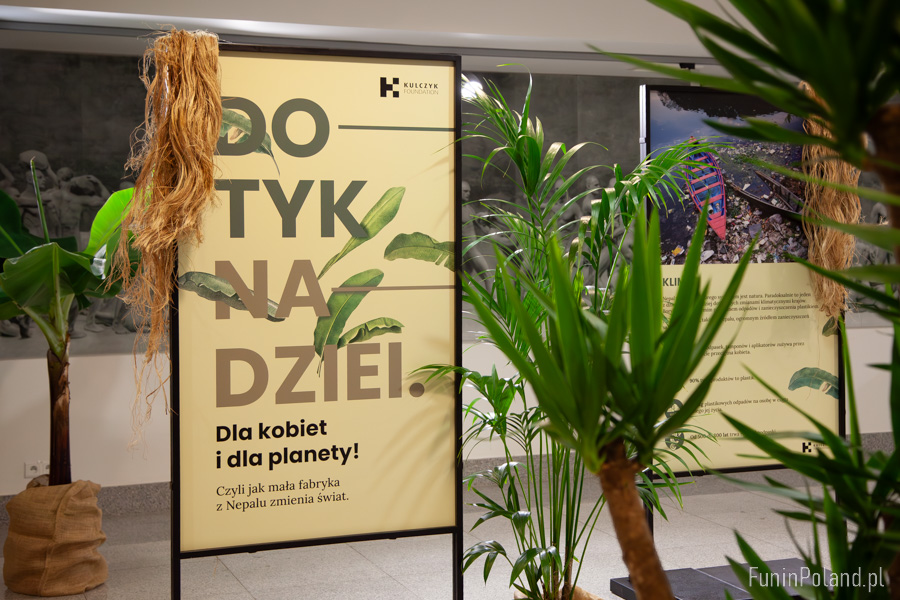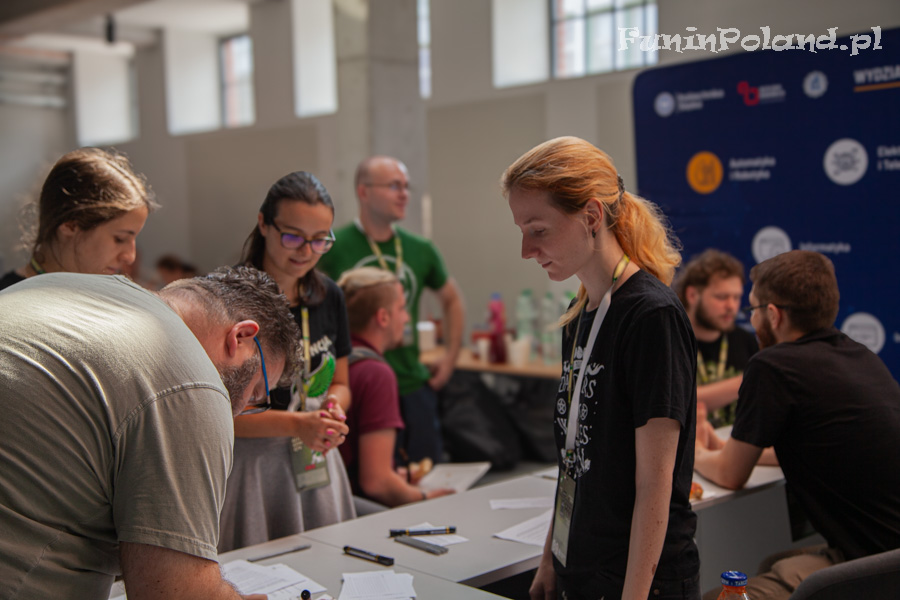
Interview with Piotr Kołodyński (Oysterboy)
The post-pandemic return of OFF-Festival after two years was accompanied by a greater emphasis on indigenous Polish artists – from debutants to artists with experience on large festivals’ stages. Among the latter of those was Piotr Kołodyński’s solo act Oysterboy. The artist performed on the first day of the festival with his dedicated band (Artur Chołoniewski, Sebastian Polus, Antoni Zajączkowski). Despite the concert unfortunately coinciding with the most hellish weather conditions of that day and a few minor resulting problems (human- and equipment-caused), the band managed to give us a highly-rated performance demonstrating their craft, as well as numerous reasons to keep an eye on Oysterboy’s future – including announcement of his first album, coming soon.
Below is the edit and translation of the interview that Piotr Kołodyński gave FunInPoland’s representatives after the concert:
Weather vs Artist: 3-0?
At first we were actually happy with this weather. The kind of music we play feels like of a chilled-out and calm variety when played as recordings, but when we perform it live, we sometimes go all-out with guitars and drums. Such a way of spending our energy is quite a fitness routine. But with 50 degrees of Celsius inside the tent, we ended up completely drenched in sweat. It’s difficult to sing in these conditions, but on the other hand it’s actually satisfying to put in such an effort – like after a soccer game or triathlon.
Have you ever played in such conditions?
This was my debut on such a big stage inside an enormous tent – on such a major festival at that. This was quite a high bar to jump, to continue with sports analogies. As a minor sidenote – actually I am not a soccer fan.
Oysterboy is quite an unusual name for your music act. How did you come up with it?
Back when I studied in London, I used to carry a subway ticket card called Oyster Card. When visiting the city a few years later, I went to Tate Modern art gallery and bought a random book from a souvenir shop. It was a book about works of Tim Burton, who I knew little about past the common knowledge like him directing Batman movies from three decades ago. When I opened it, the first words my eyes landed on were Oyster Boy. At that time, I was already planning to found my solo music project. When I read that name, it instantly clicked in my head – this is the perfect name for me. Many people have told me that my eyes are like bivalves – like seashells with pearls in the middle. An oyster can be ugly on the outside, but beautiful on the inside. I empathize myself with this a bit – I also like to retreat into my shell from time to time. And the aforementioned London Oyster card, what with London being one of the cities I feel particularly associated with, possibly the most. So I simply decided that from then onward I am Oysterboy.
Until recently you were known mostly as the lead vocalist of Polish rock band Terrific Sunday, but now there’s Oysterboy, which is a primarily pop project. What led to your decision to take this direction solo?
I would emphasize that this is indie pop – there is a lot of independence in this sound. Furthermore, on stage we tend to lean towards rock music to spice our performances up. There’s definitely a lot of Terrific Sunday’s influence in this project – I write and sing the lyrics in both, after all. As Oysterboy I am also assisted by Terrific Sunday’s drummer Artur Chołoniewski. But I still went in this direction because I wanted to finally express myself through the softer music, of the kind that is currently on the rise in the West. This is a kind of bedroom pop – one a producer or musician can create in his own bedroom, still in pyjamas. It is also partially based on dreampop, of style similar to Slowdive or DIIV, the latter of whom is actually about to play today.
We took a partiular note of a specific change – as vocalist and lyrics writer of Terrific Sunday you were singing mostly in English, but your Oysterboy songs have – so far – all been sung in Polish.
Indeed. To give you a backstory, I did want to start this project with English songs, but when I consulted this with a few people, line of reasoning was basically: „Look, where do you want to create and promote your music?” – „In Poland, of course.” – „Then sing it in Polish.”. So I said okay, this would actually be challenging for me, and I ended up writing Polish songs only. But I cannot rule out releasing something sung in English in the future. Even now, whenever I post a guitar on social media, people from all over the world ask in comments when am I releasing this. And I’d feel a bit stupid answering that soon, but in Polish only. So I think that in the future I will end up making a few English compositions. In fact, whenever I make demos of Polish songs, they always start with English lyrics that are then translated into Polish.
In reference to this, can our international readers expect your concerts outside Poland in the future?
I really wish, but that would require Polish language to gain a foothold in international music scene, like Ukrainian and Russian did. For example tomorrow Molchat Doma from Belarus are going to play here on OFF. In the past they had a gig in Poznań – I was helping with promoting it and we ended up gathering an audience of a few dozen. It’s amazing that they managed to jump all the way to playing on festivals of OFF’s caliber. This is a kind of music that’s very close to my heart and has a lot in common with what I’m doing as Oysterboy. This shows that this approach to music has spread all over the world. Even though their language – unlike English – seems to disfavor singing at first glance, they’ve managed to succeed internationally. Who knows, perhaps Polish language will join this league some day. If this were to happen, I’m immediately doing a tour across Europe and USA.
How do we promote it? With our famous tongue-twister “Chrząszcz brzmi w trzcinie w Szczebrzeszynie”?
Even I have a hard time saying that one. (laugh) But my lyrics in Oysterboy are sufficiently soft that I believe even someone non-Polish might be able to sing it. At least to some degree. I don’t know if an average German could sing „miłość chcę, miłość chcę”. But I have my hopes.
When recording your Youtube music videos you’re using cameras from the 60s, reflecting the cinematographic aesthetics of that time. What convinced you to do this?
I really like the 60s overall. The Beatles are one of my all-time favorites, and they had a lot of stuff recorded with 8mm and 16mm cameras. There’s also something about analog movies that we no longer have in our smartphone and digital camera-recorded movies. That’s a completely different vibe – the imperfections, casettes with only 3 minute total length, the uncertainty how the recording will turn out before it’s processed, the relief and joy when it turns out everything went fine. That’s the essence of this vibe and a superb fit with my project, as the latter is also done in partially analog way, with a large dose of nostalgy and longing for the past.
What do you think are the odds that this vibe will become the mainstream of Polish music scene?
I think this is already becoming mainstream. For example we have artists such as Michał Anioł, who hails from total mainstream, yet features some neat guitars in addition to a nostalgic, melancholic playing style similar to Mac DeMarco. On the other hand we have Kacperczyk brothers with origins in trap – a genre that retained high popularity in Poland for a long time – that also use live instruments, guitars and percussion. It’s great that this is making a comeback, that this isn’t all about computers and production from samples anymore – that people play their music live. It’s a sign that this is making a comeback in Poland, and I believe it will enter the mainstream. This has been going on in the West for a decade. Maybe Poland is now going through the same thing – I would be very happy if this turns out to be the case.
What music do you listen to nowadays? Does it have an impact on your own compositions?
These days I’ve been passionately enjoying DIIV and it 100% has an impact. They are my #1 inspiration now. They’re soon starting their concert on the main stage and I’m running to the first row to sing and scream along to them. There’s also Beach Fossils, who are also friends with DIIV, as well as Wild Nothing – so projects in mostly indie pop style, just like me. But this differs among the artists – for example I heard that DIIV enjoy heavy hip hop despite making dreampop/shoegaze music. So there’s no rule that you need to create the kind of music you enjoy casually, though this is the case with me. I frequently return to The Beatles and other classics, but also enjoy some indie rock stars and harder sounds – Foals, for example. On occasions I may also enjoy a song by Rihanna, Rosalie or Beyonce – though I’m not a fan of Beyonce’s newer releases.
Your recent single „Mediolan” made together with Niemoc band is your first collaboration as Oysterboy. What was your experience with this teamup?
In the past Terrific Sunday did very few collaborations. One time we played with Mela Koteluk (Polish pop singer) on Fryderyk festival, which was an incredible experience. But I think that this will be a much more frequent occurrence as Oysterboy. Anytime an artist asks for a collaboration and I have time for it, I will simply answer “yes”. Collaboration is a great adventure that allows us to completely leave the bounds of what we usually do and take on a different role in a band. For example Niemoc did music that captivated me right off the bat and I thought „this is it”. I immediately proceeded to record some improvised lyrics while still in my pyjamas, most of which ended up in the final product. I got so hooked that I would absolutely love to have more collaborations like this.
Who would you like to collaborate with, for example?
Molchat Doma and DIIV are my dreams, but truthfully I would settle for any producer I respect. But I would even agree for any unknown producer, artist or musician if only he/she sends me some material and can feel a quality vibe.

The most interesting events in Poland on summer. Concerts, Festivals and outdoor events. Jazz, Rock, Reagge, Rap, Hip-Hop, Beer and traditional polish food.

